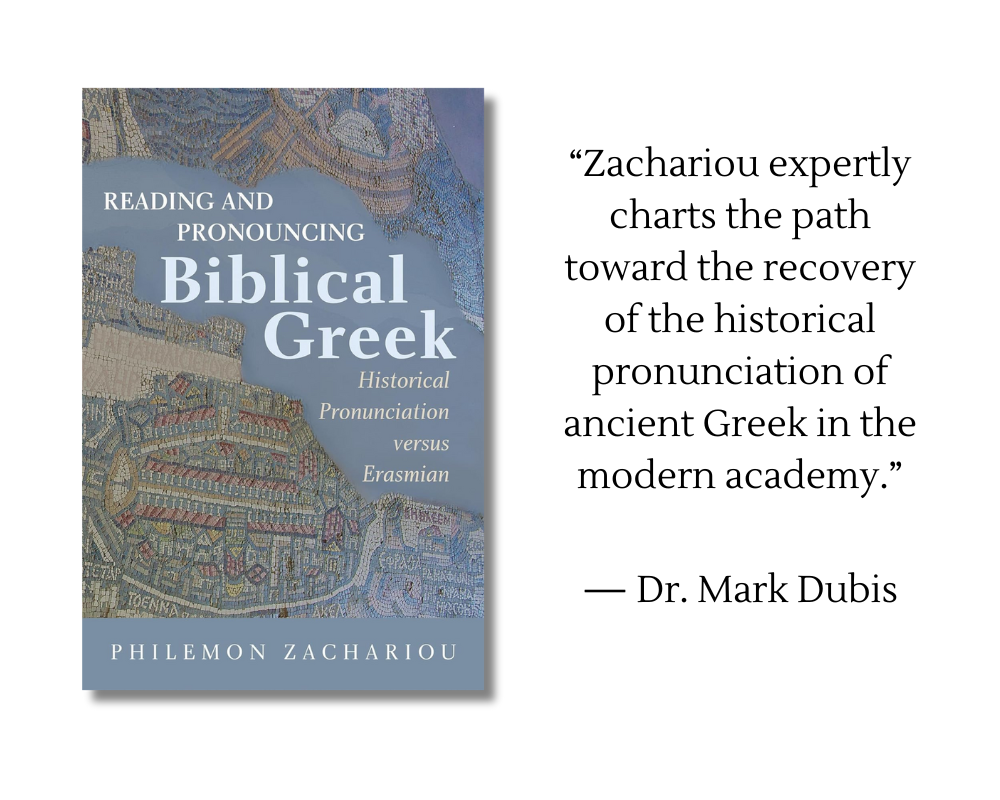Interested in learning Biblical Greek? BibleMesh Biblical Languages will guide you to become a confident reader of the biblical text—and it begins with taking your first steps.
Find out more and get our Greek First Steps course for free.
First-century Greek speakers didn’t pronounce words like most modern seminarians are taught to pronounce them. While today’s budding Greek scholars are taught to pronounce the letter ƞ (eta) like the final vowel sound in “obey,” it actually was pronounced like the vowel sound in “feet.” Contemporary students are taught to pronounce the letter ω (omega) like the long o in “tone,” but in the first century it was voiced like the short o in “for.”
These and other pronunciation differences are explained in a new book by BibleMesh Institute academic tutor Philemon Zachariou, Reading and Pronouncing Biblical Greek: Historical Pronunciation versus Erasmian. The system employed in most contemporary college and seminary classes (known as the Erasmian pronunciation) dates from the sixteenth century and sounds vastly different from the language of Jesus and Paul, argues Zachariou, a native Greek and retired Greek professor. Mispronouncing the New Testament language not only is a matter of linguistic inaccuracy, he writes, it has implications for biblical interpretation as well.

“What is at stake,” he claims, is “the meaning of the Greek texts, which needs to receive light exegetically not just from earlier but also from the later history of the language.”
Zachariou advocates a system known as “historical Greek pronunciation” (HGP). BibleMesh Biblical Greek offer students the option of learning either HGP or Erasmian pronunciations.
The Renaissance scholar Desiderius Erasmus originated Erasmian pronunciation in a 1528 book. Ironically, Erasmus himself did not utilize the pronunciation named after him, nor did he advocate its use. But within several decades, it became dominant—due in part to the antagonism of early Protestants toward Eastern Orthodox scholars who employed HGP, Zachariou argues, and in part to the Greeks’ then-struggle with Turkish oppressors, which hindered them from speaking into the debate.
Koine Greek, the language of the New Testament, took shape in the fourth century BC, according to Zachariou, when Alexander the Great united all the peoples of Greece and their dialects amalgamated into one common tongue. That koine dialect spread throughout the known world, continuing in the medieval Byzantine Empire and adapting into modern Greek (known as Neohellenic) with few material changes.
Greek grammarian A.T. Robertson wrote in the early twentieth century that “few even among professional scholars are aware how small the difference is between the Greek of the N.T. and a contemporary Athenian newspaper.”[1]
But can Erasmian pronunciation actually inhibit New Testament study? Zachariou says yes.
Utilizing HGP helps students understand that nuances of some biblical words are reflected in their modern use more than their classical use—which can reflect the state of Greek dialects before they coalesced into koine. Zachariou notes as examples the terms in John 15 often translated as “vine” (ἄμπελος [ambelos]) and “branches” (κλήματα [klimata]). In light of Neohellenic, he argues, they are better translated as “vines” (κλήματα) and “vineyard” (ἄμπελος). This revised translation is more accurate linguistically, he claims, and it more effectively conveys the theological notion of the passage: by remaining planted in Jesus like vines in the ground, His disciples receive necessary spiritual nutrients and live to produce fruit.
BibleMesh Greek coordinator Mark Dubis said in commending Zachariou’s book, “In the 1500s, the chancellor of the University of Cambridge decreed that students who used the Erasmian pronunciation be expelled. How, then, have we gone from such eschewing of Erasmian to the nearly wholesale adoption of it in today’s English-speaking colleges and seminaries? Zachariou expertly illumines this history and charts the path toward the recovery of the historical pronunciation of ancient Greek in the modern academy.”
Philemon Zachariou is a native Greek, a retired Greek professor, and the author of Reading and Pronouncing Biblical Greek: Historical Pronunciation versus Erasmian. He is also a BibleMesh Greek Teaching Fellow.
“This video will give you a clear view of what the Historical Greek Pronunciation (HGP) is, and how it is preserved in Neohellenic (“Modern” Greek). Viewers of this video or readers of the book, especially those wondering about the role of Erasmian, will be assured not only about the way Biblical Greek ought to be pronounced but also why.” —Phil Zachariou
Reading and Pronouncing Biblical Greek is available through Amazon and other booksellers, including Wifp and Stock.
Find out more about BibleMesh Biblical Languages.

David Roach
Senior Pastor of Shiloh Baptist Church in Saraland, Alabama. He is a church historian and journalist, and teaches across the theological disciplines at several Christians colleges and seminaries. His writing has appeared in Christianity Today and Baptist Press among other outlets.
[1] Cited in Philemon Zachariou, Reading and Pronouncing Biblical Greek: Historical Pronunciation versus Erasmian (Eugene, OR: Wipf & Stock, 2020), 9.
